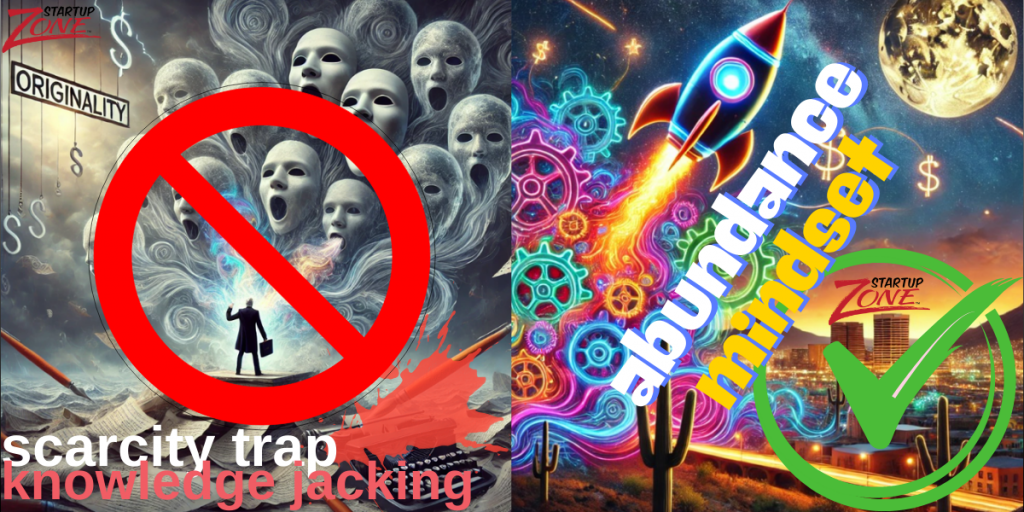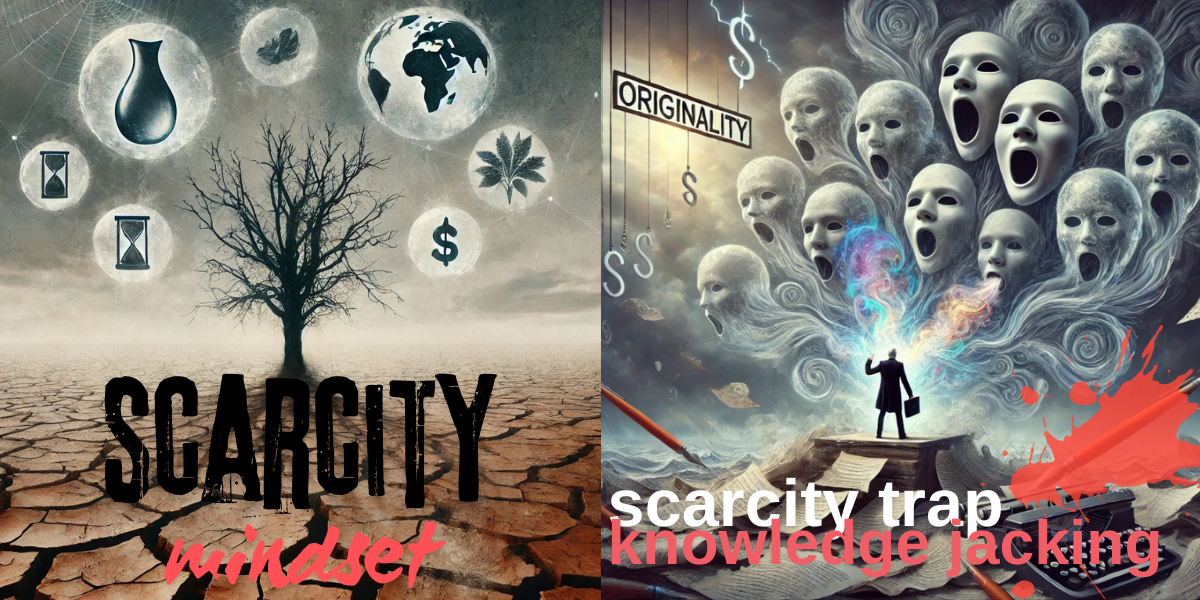Knowledge Jacking: The Ferrari with Flintstones’ Feet
In every startup ecosystem, two forces are at play: those who build genuine trust and those who exploit it. While some see collaboration as the lifeblood of innovation, others operate with a scarcity mindset, believing that knowledge is a limited resource to be extracted, repackaged, and claimed as their own.
This mindset gives rise to a toxic behavior I call “Knowledge Jacking.”
At first glance, knowledge jacking looks like curiosity, collaboration, or partnership. Someone shows interest in your expertise, your experience, or the years you’ve invested in mastering a subject. They set up numerous meetings under the guise of collaboration: “Let’s explore a joint venture,” or “I’d love to interview you for a role on our team,” or “Maybe we can co-develop a program.”
But beneath that invitation lies a hidden intent. Their goal is not to collaborate and certainly not to elevate others. They aim to harvest your insights, repackage them with their name on top, and present themselves as the authority.
It’s exploitation disguised as opportunity.
The Mechanics of Knowledge Jacking
Here’s how it often unfolds:
- The Setup – A request is framed around opportunity. Knowledge jackers position themselves as someone who could bring you into a project, secure you in a role, or open a door for partnership.
- The Extraction – Once you open up, they take copious notes, absorbing your frameworks, stories, playbooks, and lived experience. You generously share, thinking this could be the start of something impactful.
- The Switch – When is it time to follow through on a partnership? Silence. Instead, they implement what they learned in isolation, without attribution or acknowledgment.
- The Performance – They position themselves publicly as the expert. They launch the program, write the article, or pitch the idea, complete with your shared language.
- The Fallout – Initially, it looks impressive, like a Ferrari gleaming under the showroom lights. But pop the hood, and you find Fred Flintstone’s feet pedaling furiously beneath. It’s all surface, no substance.
Why It’s So Damaging
On the surface, knowledge jacking may look like flattery: “They thought my insights were worth jacking!” But the consequences ripple far beyond individual egos.
- It erodes trust. Once people realize their generosity can be exploited, they become guarded. Conversations that should be open and generative are held back. Instead of fueling an ecosystem, ideas get locked in silos.
- It sabotages collaboration. Knowledge jackers don’t actually want co-creators; they want to stand on the shoulders of others while pretending they climbed alone. As a result, they slow down the progress they claim to accelerate.
- It creates hollow leaders. For a while, they may impress outsiders who don’t yet see the cracks. But eventually, the lack of depth becomes apparent. Investors, customers, and collaborators determine that “there is no there there.”
- It reinforces scarcity. By hoarding credit and operating from fear, they model the behavior that keeps ecosystems from thriving. Instead of multiplying opportunity, they shrink it.
The Scarcity Mindset at Work
Knowledge jacking doesn’t happen in a vacuum. It’s rooted in a scarcity mindset, the belief that there isn’t enough credit, opportunity, or recognition.
The scarcity thinker believes:
- “If I give someone else credit, I’ll lose standing.”
- “If I bring in a partner, I’ll be overshadowed.”
- “If I acknowledge where the idea came from, it makes me look smaller.”
So they cling, hoard, and claim what isn’t theirs. The irony? By doing so, they guarantee short-term wins at the cost of long-term credibility. They may get the contract, the seat on the panel, or the spotlight for now. But as soon as others look under the hood, the Flintstones’ feet are exposed.
The Abundance Alternative

Contrast that with the abundance mindset.
Leaders who operate from abundance believe knowledge expands when it’s shared. They actively elevate the people they learn from. They give credit generously, not out of obligation but of recognition that ecosystems thrive when more voices are amplified.
Abundance thinkers say things like:
- “Here’s what I learned from [Name].”
- “This program was inspired by the work of [Organization].”
- “We couldn’t have done this without the contribution of [Team].”
Instead of fearing that credit will diminish them, they understand that recognition multiplies trust and influence. They know actual expertise isn’t threatened by acknowledgment; it’s validated by it.
Protecting Against Knowledge Jacking
So what can you do to safeguard against knowledge jackers while sharing openly?
- Discern intent early.
- Test reciprocity. (I don’t like this. As it will continue to diminish trust and keep us guarded.
- Document contributions. (Yes, but then we would have to dox the individuals. I don’t like it.)
- Choose where to share. Burn me once, shame on you… Burn me twice, shame on me.
Ultimately, it is best to mitigate it as the source of the bad actor. Let’s all stop knowledge jacking.
Final Thoughts
Knowledge jacking is one of the most insidious behaviors in a scarcity-driven ecosystem. It masquerades as curiosity, but its impact is theft of trust. It builds Ferraris with Flintstone engines, shiny shells with no horsepower under the hood.
If we want ecosystems that thrive, we must call this behavior out when we see it. We must reward those who elevate others, not those who hijack. We must replace scarcity with abundance because only in a culture of trust and credit-sharing do ideas become innovations, and innovations become movements.
The Buried Lead
You were likely wondering if this happened to me.
The answer is yes to all examples. I wish they were honest, as I would have shared it willingly. Why? Because I go out of my way to help people.
Why am I sharing this? Because it needs to be called out. Not to embarrass people, but to mitigate this knowledge jacking and counterproductive behavior.








